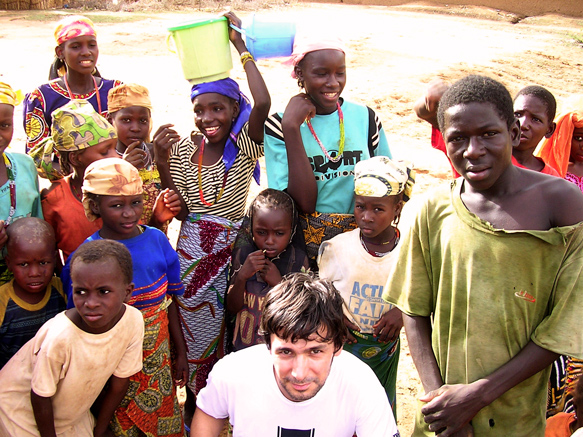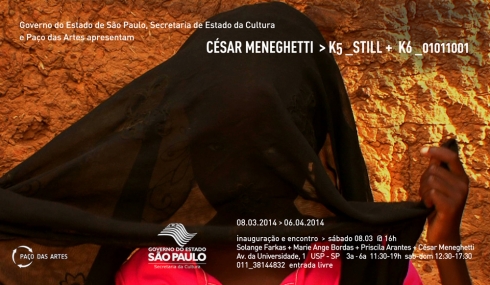Africa-Brazil art and transnational processes
Paço das Artes – a facility of the State Secretariat for Culture of São Paulo – will inaugurate the show K_, an art project from César Meneghetti, on Saturday, March 8 at 4:00 pm. On that occasion, issues relating to art and Africa-Brazil transnational processes in César Meneghetti’s experiments will be discussed at a a meeting featuring Solange Farkas, founder and curator of Associação Cultural Videobrasil, and Marie Ange Bordas, visual artist, writer and researcher. The discussion will be mediated by Paço das Artes technical director and curator Priscila Arantes.
Throughout 30 years of holding the Contemporary Art Festival Sesc_Videobrasil – dedicated to mapping and disseminating art productions from the geopolitical South of the world –, Solange Farkas has worked to establish deeper connections with Africa. Such emphasis was visible at the last edition of the Festival, which featured quality work by several African artists, two of whom won prizes (Bakary Diallo, for his Tomo, and Luc Foster Diop, for We Are One), Videobrasil’s relationship with Africa has been clear to see ever since it organized the Pan African Contemporary Art Show (2005) and the African Contemporary Art Show (2000), both curated by Farkas.
Recently, two important 18th Festival’s Public Programs activities and one action held in partnership with the Goethe Institut have also tackled issues pertaining to African art and its internationalization, and featuring artists, curators, and thinkers from several countries. These actions included the launch of Caderno 9 Sesc_Videobrasil: Geographies in Motion, based on Marie Ange Bordas’ research on African refugees, and featuring contributions and texts by artists and scholars like the Cameroonian intellectual Achille Mbembe, the Swiss-Cameroonian curator and critic Simon Njami, and South Africa’s William Kentridge; and the first Brazilian edition of “Summer Conversations: Archives on Non-Racialism,” a meeting featuring intellectuals from Brazil, South Africa and the United States who specialize in philosophy, anthropology, political sciences, and history, among them the historian and anthropologist Lilia Schwarcz; the historian and USP Brazil-Africa Research Support Center coordinator Marina de Mello e Souza; Associação Museu Afro Brasil researcher Juliana Bevilacqua; photographer Eustáquio Neves, from the state of Minas Gerais; and the artist and researcher at Recôncavo Baiano Federal University, Ayrson Heráclito, who won an artist residency prize in Dakar, Senegal during the 18th Festival.
In her chat with Marie Ange Bordas and the artist César Meneghetti – whose K_ show features the outcome of his immersion into Keita Valley, an area between the Sahel and Central Africa –, Farkas will discuss some of this history of moving closer to Africa, and the potency of African art in contemporary times.

More on the K_ show
Open for visitation at Paço das Artes up until April 6, César Meneghetti’s show features the pieces K 05_still femmes (video, 15 min. HD color), and K 06_01011001 (triptych video, 4’, 10’ and 11’, HD, color), both of which are part of the relational/multimedia project K_lab – interacting on the reality interface, created in Africa (Niger-Italy 2007/2009). Comprising 7 pieces (videos, photographs, installations and documents), K_lab – interacting on the reality interface narrates, documents and reviews Keita Valley’s (mostly female) population’s work in fighting desertification. The project was presented for the first time in 2008 at Rome’s Laboratory Museum of Contemporary Art (MLAC), with curating from Simonetta Lux and Domenico Scudero.
“In César Meneghetti’s work, the arranging of recoded material or immaterial lines converges with the human condition, affection, and the problematics he has intercepted and lived out along his path through the world, from Brazil to Europe, to the East, to Africa, recreating transnational interconnections which he converts into language, into work, into art. It is a rare way of communicating and sharing that which art alone allows one to experience,” writes the art historian and critic Simonetta Lux in the show’s opening text in Italy.
In K 05_still femme, the portrayal of African peasants during a work break creates a double record, at once objective/subjective, observer/observed, a realistic, non-idealized portrait, and finally arrives at the landscape of the area in the video’s triptych K_6 010010011 “densely paced, alternating orange and red in this brightly-lit, moving frame into which the landscape seems to sink in digital abstraction. The works of art are paradigms, footprints which the artist truly finds upon traversing Niger’s territory while working on his project. They are at once real and produced by his cultural unconscious,” writes Eleonora Carbone.
Learn more about the project
Between 1984 and 2007, the international community, the FAO, the WFP, and Cooperazione Italiana came together to fight hunger in the Keita Valley, a place which experienced a severe drought, desertification, agricultural impoverishment, and male rural exodus in 1983. Keita Valley’s rebirth was brought about by the extraordinary efforts of the locals, most of whom are women, like those featured in K 05_still femmes, who have planted nearly 20 million trees over the past 25 years, and managed to rebuild the region’s economy. Scarce, difficult-to-access water, the arid, moonlike landscape seen in the triptych K_06. The sounds and voiceover are from the only female rapper in Western Africa, ZM (Zara Moussa). The song, titled “Ma Rage,” was rearranged and remixed by DJ Matthew Mountford using sounds and music recorded live by Meneghetti while in Niger.
From June until November 2007, César Meneghetti, the Italian photographer Enrico Blasi and the British filmmaker Sam Cole went on several missions to the Keita Valley, as part of the project PAFAGE (IBIMET – Italian National Research Council), in order to document the population’s constant struggle with desertification at the border zone between Sahara and Central Africa.
Meneghetti and his collaborators took part in their daily routine, recorded their statements, and exchanged thoughts and sensations with a population of peasants, discussing some of the basic notions of existence.
About the artist
CÉSAR MENEGHETTI (São Paulo/SP) is a visual artist and filmmaker. He has studied in Brazil, England and Italy. His work is cross-media in both technique and content, focusing on the issue of the anthropological other, the notion of boundaries and confines, and a constant questioning of the forms of language. He has featured in the 55th Venice Biennale, Kenya Pavilion (2013), the Biennale Sessions – Art talks at the 54th Venice Biennale (2011), the 10th Sharjah Biennial (2011), the 16th Biennial of Cerveira (2011), the Adriatic Biennial (2006), Latin American Pavilion special event at the 51st Venice Biennale (2005), and Videobrasil. He has won the 2011 FUNARTE Contemporary Art Prize, the Brazil Contemporary Art Prize from Fundação Bienal de São Paulo (2010), best video prize at the 4th Inter-American Video Art Biennial in Washington (2009), the Italian film critics prize (Nastro d’Argento - 1996 and 2004) and Petrobrás Cultural Prize (2002 and 2006). His film works include feature film “Interferenze” and documentaries “Sem Terra,” “Motoboy,” “Sonhos de Bola,” and “Terrorista.” In “K_lab – interacting on the reality interface” he reallocates his experience in film and mixed medias into the visual arts as well. He has developed the back-to-back projects “This_Orient” (Vietnam UK, 2006-2011) and “I\O _Eu é um outro” (Italy, 2010-2013) with 200 mentally ill people. Represented in São Paulo by Duplo Galeria and in Berlin by Under the Mango Tree Art Gallery.
find out more about the artist in the Collection
About the guests
Solange Farkas (Salvador/BA) is the curator and director of Associação Cultural Videobrasil. She created the International Contemporary Art Festival SESC_Videobrasil, which had its 30th anniversary in 2013. Farkas is the general curator to the event, which has become a landmark in art production from the geopolitical South of the world (Africa, Latin America, Eastern Europe, the Middle East, part of Asia and Oceania), and has featured leading international artists such as Akram Zaatari, Bill Viola, Gary Hill, Peter Greenaway, Marina Abramovic, Olafur Eliasson and Walid Raad.
Marie Ange Bordas (Porto Alegre/RS) holds a master’s in Image and Sound from ECA/USP and a specialization in photography from the International Center of Photography, New York. Marie Ange works as a visual artist, writer, and educator, focusing on displacement and its individual and collective implications. For the past ten years, she has moved between Brazil, Europe, and Africa, developing collaborative projects, and taking part in residencies and art shows. In 2013 she edited Caderno Videobrasil _09, Geographies in Motion, in which she articulates her oeuvre-career with reflections by other artists and intellectuals.
Service:
K_– Cesar Meneghetti
Opening: March 8, 4:00 pm
Roundtable with César Meneghetti, Solange Farkas and Marie Ange Bordas; mediated by: Priscila Arantes
from MAR/8 to APR/6
Paço das Artes | Av. da Universidade, 1, Cidade Universitária, São Paulo
Visiting hours: Tuesdays to Fridays, from 10:00 am to 7:00 pm; Saturdays and Sundays, from 12:30 pm to 5:30 pm
Admittance is free
